Key takeaways:
- Ocean conservation is essential for maintaining marine biodiversity and ensuring a sustainable environment for future generations.
- Major threats to ocean ecosystems include pollution, overfishing, and climate change, all of which require urgent action to protect marine life.
- Current global efforts, such as marine protected areas and community cleanups, demonstrate a growing commitment to ocean conservation.
- Individuals can make a significant impact through small changes in daily habits, supporting sustainable seafood, and engaging in local conservation initiatives.
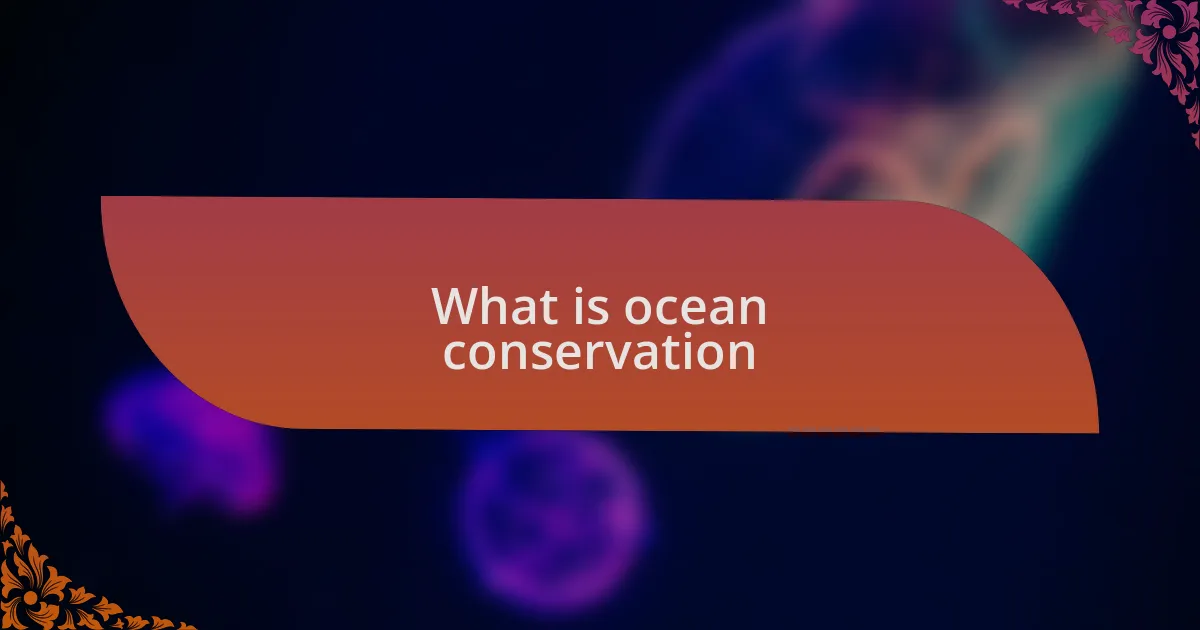
What is ocean conservation
Ocean conservation is a vital practice aimed at protecting marine ecosystems and the biodiversity they support. It encompasses a variety of efforts, from safeguarding endangered species to restoring habitats damaged by human activity. When I think about how interconnected we are with the ocean, it becomes clear that every effort counts.
I still remember my first dive; the vibrant coral and schools of fish left me in awe. It was a stark reminder of what’s at risk due to pollution and climate change. Isn’t it heartbreaking to think that future generations might not experience the same beauty?
Moreover, ocean conservation involves a commitment to sustainable practices that benefit both people and the environment. I often ponder how our daily choices—like reducing plastic use or choosing sustainably sourced seafood—can ripple out and create significant positive change. What if we all became more conscious of our impact? The ocean’s health directly reflects on our own, making it a shared responsibility.
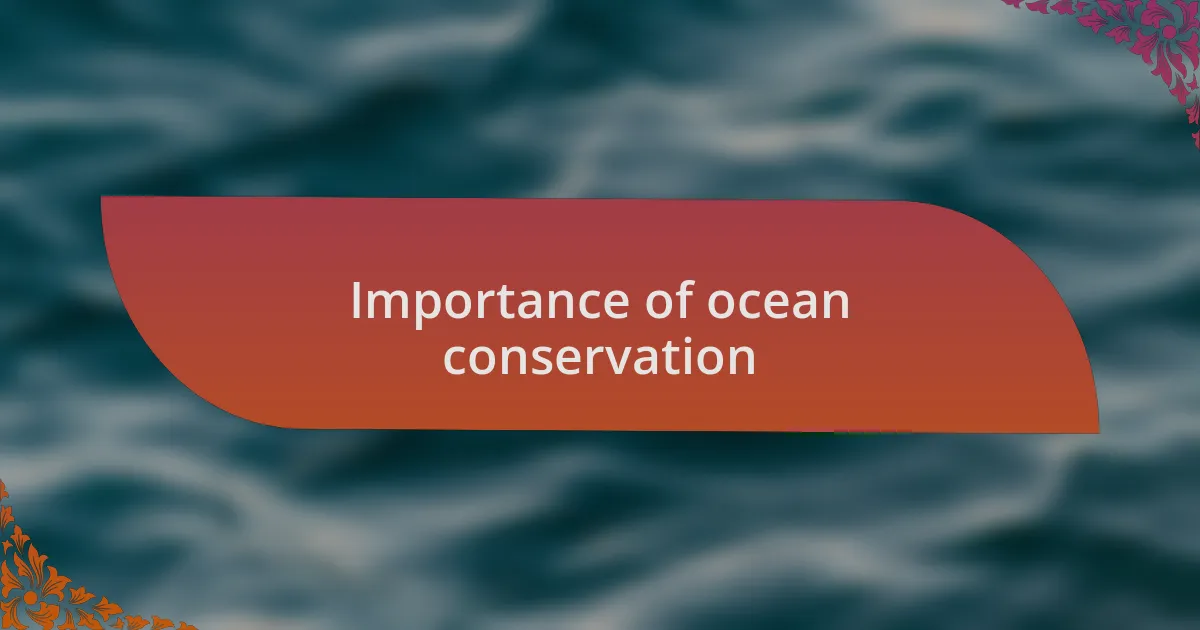
Importance of ocean conservation
The importance of ocean conservation cannot be overstated. I’ve often marveled at how our oceans regulate climate and provide oxygen. Just think about it: the ocean produces more than half of the world’s oxygen, and yet, it feels like that fact often goes unnoticed. Protecting these vast waters is essential not just for marine life, but for our own survival.
Every time I visit a beach, I’m struck by the beauty and fragility of the coastal ecosystem. Seeing litter washed ashore always leaves me feeling conflicted—there’s such beauty, and yet we’re literally suffocating it with waste. Have you ever picked up trash during a walk by the shore? It’s a small act, but it connects us to the responsibility we all share. Our actions today shape what our oceans will look like tomorrow.
The health of the ocean influences so many aspects of life, from weather patterns to the availability of seafood. I’ve witnessed firsthand communities that thrive on fishing and tourism. When the ocean suffers, these livelihoods are at risk. How can we turn a blind eye to that? Ocean conservation efforts can lead to healthier ecosystems, which in turn support vibrant communities and economies. This interconnectedness is a profound reminder of why we must protect our oceans.
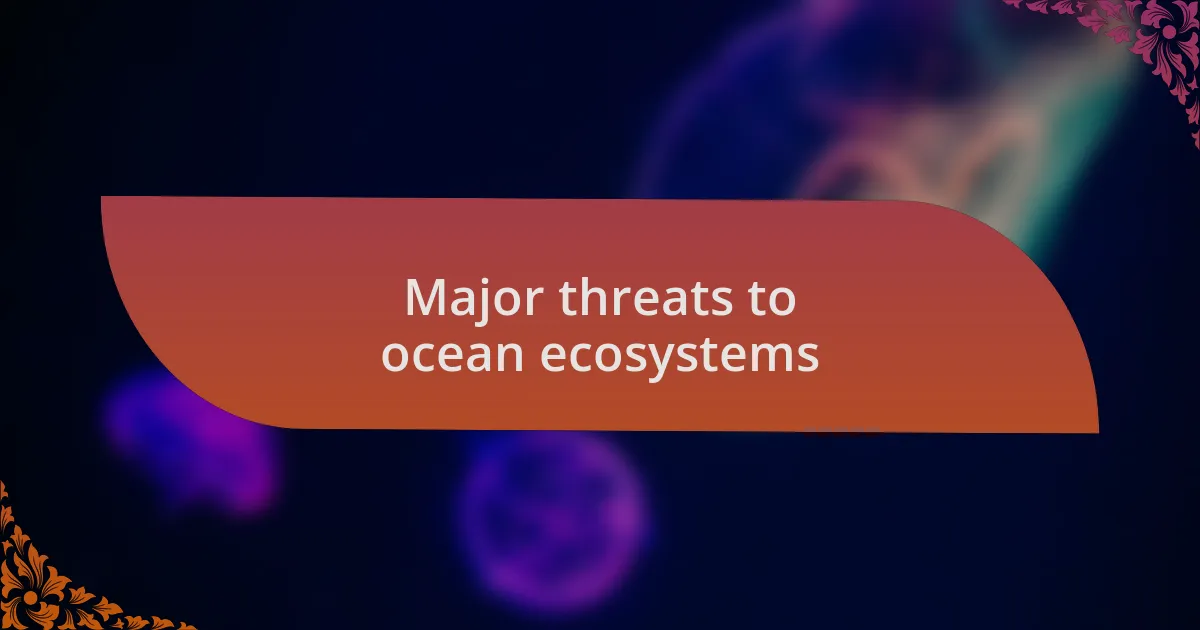
Major threats to ocean ecosystems
Navigating the depths of ocean ecosystems, one can’t ignore the multifaceted threats they face today. Pollution looms large, manifesting in various forms—plastic waste, chemicals, and oil spills. I remember once snorkeling in a coral reef, where vibrant colors turned murky due to plastic debris. That moment was a stark reminder of how our habits ripple through the water, impacting both the beauty I witnessed and the life that depended on it.
Overfishing is another pressing danger. I’ve had conversations with local fishermen who lament the decline in catches over the years. It’s difficult to fathom how swiftly we can deplete resources that take generations to recover. What options do these families have if the fish populations dwindle? This issue isn’t merely about dwindling seafood supplies; it’s a matter of cultural identity and economic survival for many communities.
Climate change adds another layer of complexity, leading to ocean acidification and rising temperatures. After witnessing coral bleaching during a trip to the Great Barrier Reef, I realized how interconnected these changes are. It’s heartbreaking to know that the ecosystems I cherish are at risk. How can we sit idly by while their survival hangs in the balance? Our oceans need urgent action if they are to endure for future generations.
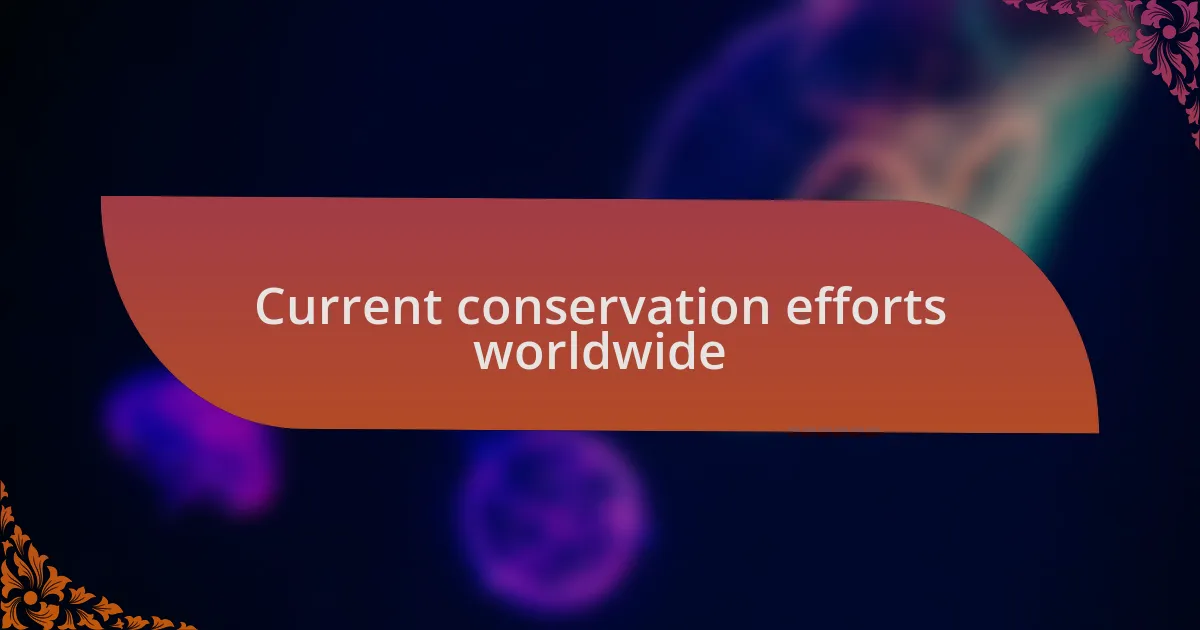
Current conservation efforts worldwide
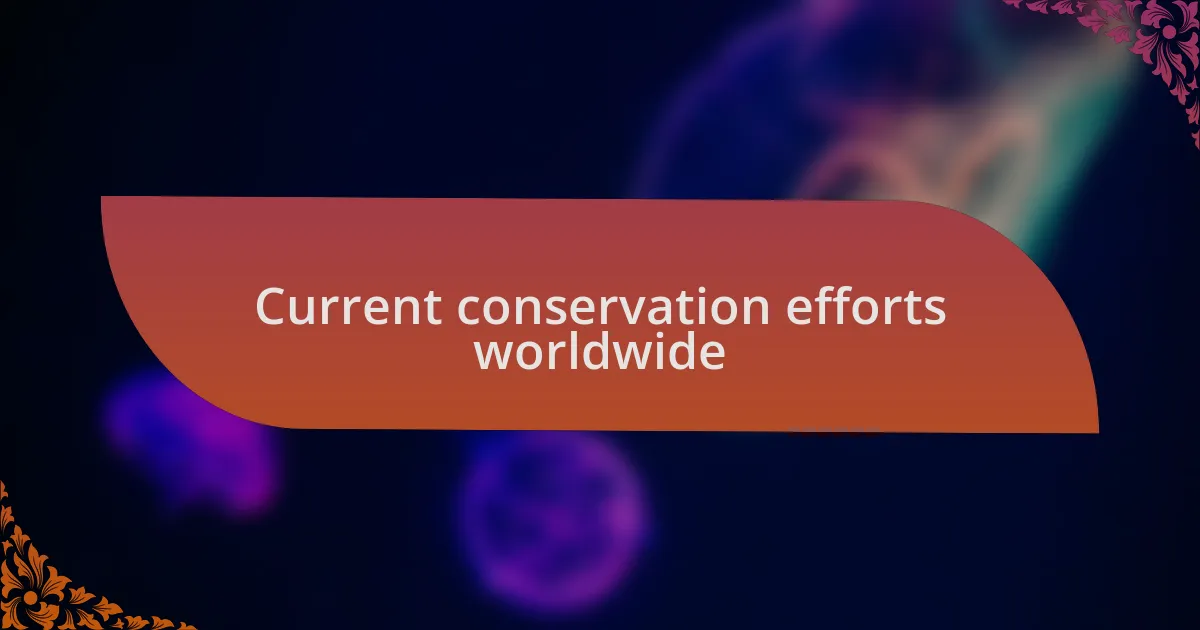
Current conservation efforts worldwide
Around the globe, there’s a growing momentum towards ocean conservation, with initiatives like marine protected areas (MPAs) gaining traction. I recall standing on the shoreline of a recently designated MPA where the community celebrated its protection. It felt like witnessing a collective promise to safeguard our seas and the vibrant marine life that inhabits them. How inspiring to see communities rally together for a common cause!
In another instance, I attended a local beach cleanup organized by a grassroots organization. It was eye-opening to see how many volunteers showed up, each of us driven by a desire to make a difference, no matter how small. The laughter and camaraderie among us reminded me that while the problem is vast, individual efforts can create ripples of change. What if every person took just one day a year to clean up? Imagine the collective impact!
Technology is also stepping up to help conservation efforts. I’ve heard about organizations using drones to monitor illegal fishing and track wildlife patterns—an innovative approach that aligns perfectly with our digital age. It raises an important question: how can we harness technology to encourage better practices and restore ecosystem health? As I explore these advancements, I feel a surge of hope that maybe, just maybe, our oceans can thrive once more.
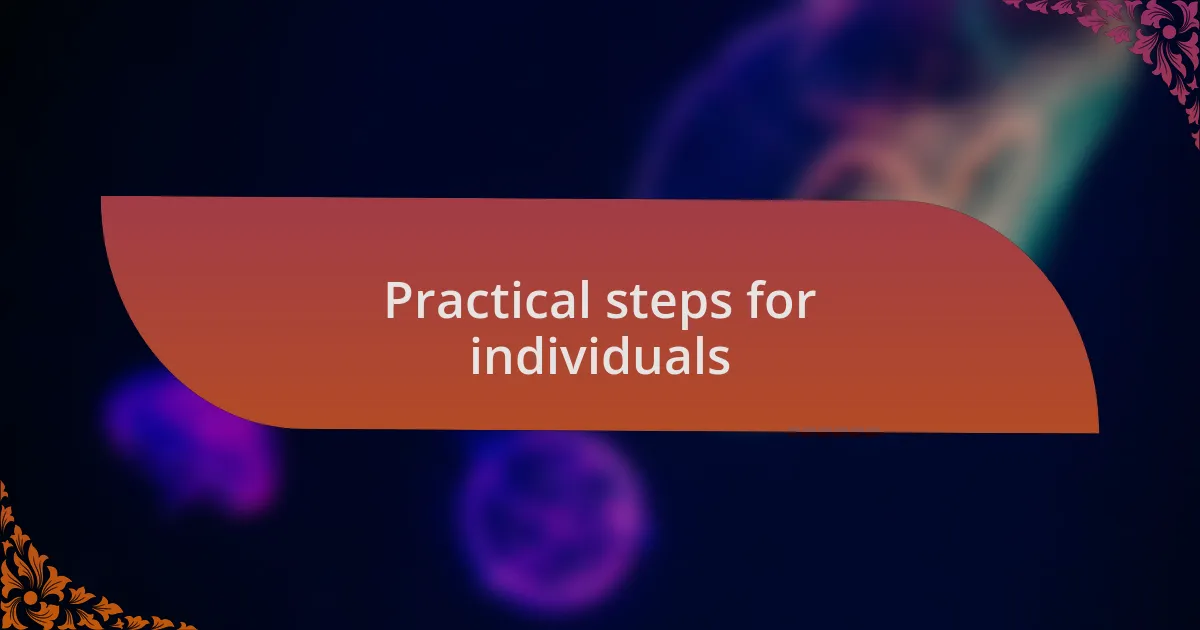
Practical steps for individuals
Taking personal action can feel overwhelming, but I’ve discovered that even the smallest efforts can lead to significant changes. For example, I began using reusable bags and bottles to reduce single-use plastics in my daily life. It’s a simple switch that not only lessens my environmental footprint but also sparks conversations with friends and family about their habits. Have you ever noticed how sharing our small changes can inspire others?
Another practical step is advocating for sustainable seafood. I remember the first time I checked a seafood sustainability app while dining out. I felt empowered making informed choices about what to order, knowing I was supporting responsible fishing practices. It’s a good feeling, realizing that my dish could contribute to healthier oceans. Have you tried this before? It could change how you perceive your meals.
Engaging in local conservation initiatives can also be a game-changer. Participating in citizen science projects has allowed me to feel directly connected to marine research. The last time I volunteered for a data collection excursion, I was amazed by how much we could learn from contributing just a few hours of our time. It transforms the way we view our role in conservation. What could you learn by joining such a project?
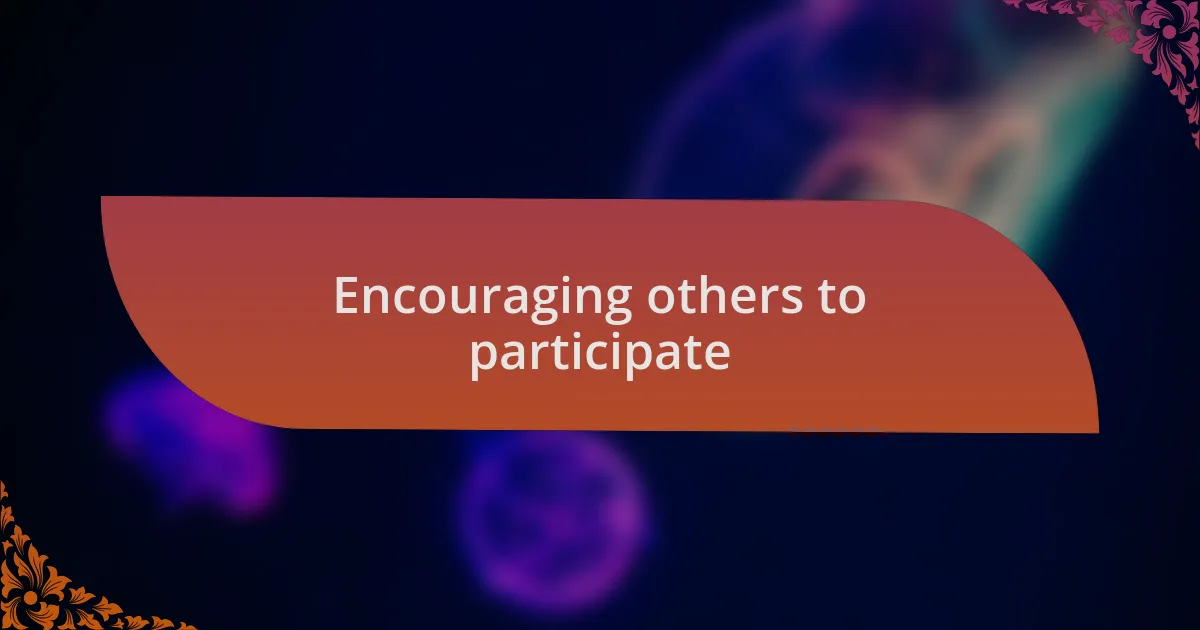
Encouraging others to participate
Encouraging others to participate in conservation begins with leading by example. I vividly recall organizing a beach cleanup with friends. As we collected trash, I was surprised by how many people stopped to ask what we were doing, some even joining in. It felt rewarding to see my enthusiasm transform into collective action; have you ever noticed how one person’s passion can spark a movement?
Another effective way to engage others is through storytelling. I’ve shared my experiences about discovering marine life while snorkeling with younger relatives, which ignited their curiosity about ocean health and urged them to become stewards of the sea themselves. Their excitement was palpable as they started asking how they could help protect the environment. Have you thought about how powerful your stories can be in inspiring others?
Social media is another fantastic platform for this cause. I had a moment of realization when I posted about a recent ocean conservation initiative I participated in. The amount of messages I received from friends wanting to learn more was astonishing. It reminded me that sharing knowledge online not only raises awareness but also invites others into the conversation. What impact could your posts have in encouraging change within your community?